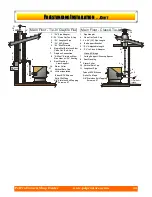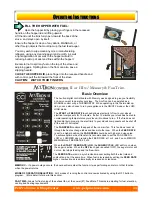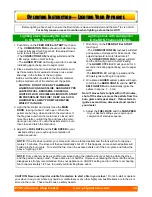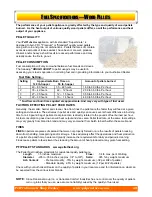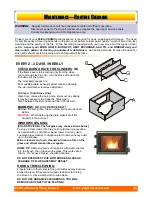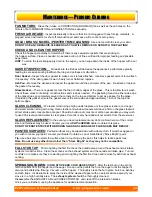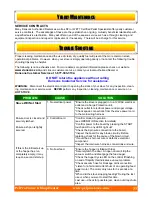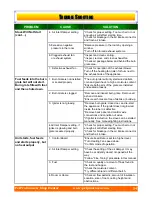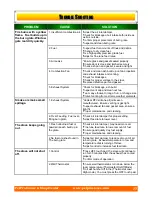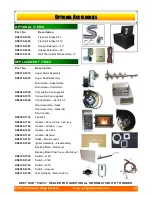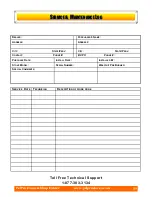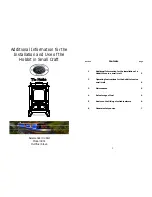
27
O
O
PERATION
PERATION
—
—
P
P
ERFORMANCE
ERFORMANCE
E
E
NHANCEMENTS
NHANCEMENTS
A
HIGH QUALITY FIRE
should burn with a
brisk, vibrant, yellow to white color flame.
When watching the
fuel burn in the grate, you should see a slight movement.
The fuel should not be just setting there, doing
nothing, like couch potatoes. At the same time you should not see most the fuel being blown out of the burn
grate, commonly know as “Pop Corning”.
Another way to confirm a proper air and fuel mixture is to view the amount the glowing embers off to the left
and right of the burn grate. If there are no or little embers, the appliance requires more air. If there are a large
amount of embers and they continue to glow for over 15 to 30 seconds, the appliance requires less air.
The proper setting will give you some embers, and these embers will last no longer then 15 seconds.
A flame exhibiting a lazy, orange or sooty characteristic is a poor quality and inefficient flame. A poor flame
produces less heat, increases sooting and may cause a smoky exhaust. If a poor flame exists for any period
of time, clean your stove and exhaust system.
NOTE: It is a good practice to check the quality of your burn every time you start on a new skid of
pellets. Because of handling, tree quality, season, transportation, etc., fuel may not be
Consistent from ton to ton or even bag to bag.
GIVING YOUR APPLIANCE A “TUNE-UP”
START APPLIANCE AS PER LIGHTING INSTRUCTIONS
,
Let the appliance go through the entire START-UP procedure. When the
FEED RATE LED stays solid, turn the feed rate to the # 4 setting (or High).
Allow the appliance to run on HIGH for 10 minutes before you begin to make adjustments
.
AUGER CYCLE indicator
should be lit “ON” for 3 seconds and “OFF” for 3-5 seconds.
Adjust the
AIR INLET DAMPER
.
This will have to be set, as the factory can not send the
units out with the damper pre-set. This is done to accommodate a wide range of installa-
tions, elevations and fuel type and quality.
Slide the damper closed ( pushed in all the way)
Now open (pull out) the damp approximately 1/8”. Watch the fire.
Check for the characteristics of a good fire, see above for details.
If not happy, pull out the damper another 1/8”, again check the fire.
Continue opening the air inlet damper as needed to obtain a fire that is brisk
enough to carry ash out of the grate, but not so brisk that it carries full pellets
out as well (known as “Pop corning”).
Mark the Adjusted
AIR INLET DAMPER
.
Once the damper is adjusted correctly, simple take a
screwdriver and scrape the paint off the rod, right at the
rubber grummet. This will help in finding the right location again if the
Damper gets moved or adjusted accidently.
NOTE:
The best way and only way to set the Air Inlet Damper is at the
FUEL SETTING
#4.
Confirm Low (1) Feed Setting and burn,
only after
performing the Air Inlet Damper setting
.
Check for the
characteristics of a good fire, (see above for details, the flame
height will not be as tall). If you need to adjust the amount of air going
through the burn grate, you can adjust the FAN TRIM pot. Using a small
screwdriver, carefully, adjust the FAN TRIM (see diagram) to give you the optimum
burn and heat desired.
IT IS CRITICAL FOR THE CORRECT OPERATION OF YOUR STOVE THAT THE BURN
GRATE, AIR INLET DAMPER, AND 1 & 4 FUEL RATE BE SET CORRECTLY!
Before performing a “Tune-Up”, ensure the burn grate, burn pot and glass window are clean and free of debris.
If log option is purchased, do not install until fine tuning is complete.
PelPro Home & Shop Heater www.pelprostoves.com 27
FEED RATE
START
FEED RATE
1
2
3
4
FINE TUNE ADJUSTMENTS
1
4
FAN
Increase
Decrease
Summary of Contents for HHPP2
Page 40: ...40 ...








